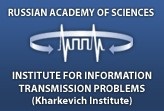Session: Local Area Networks
802.11 Buffers: When Bigger is Not Better?
David Malone, Hanghang Qi, Dmitri Botvich, Paul Patras
Abstract: While there have been considerable advances in the modelling of 802.11's MAC layer in recent years, 802.11 with finite buffer space is considered difficult to analyse. In this paper, we study the impact of finite buffers' effect on the 802.11 performance, in view of the requirements of interactive applications sensitive to delay and packet loss. Using both state-of-the art and simplified queueing models, we identify a surprising result. Specifically, we find that increased buffering throughout an 802.11 network will not only incur delay, but may actually increase the packet loss experienced by stations. By means of numerical analysis and simulations we show that this non-monotonic behaviour arises because of the contention-based nature of the medium access protocol, whose performance is closely related to the traffic load and the buffer size. Finally, we discuss on protocol and buffer tuning towards eliminating such undesirable effect.
On the Capacity of a PPM UWB Multiple-Access System with a Single User Noncoherent Reception
Dmitry Osipov, Alexey Frolov, Victor Zyablov
Abstract: We consider an uncoordinated multiple-access system that employs a modulation technique in which the probability of suppressing the signal sent by a certain user can be considered negligible to transmit information via a wireless channel (e.g. time hopping (TH) with pulse position modulation (PPM)).This channel can be considered as an A channel (channel without intensity information)\cite{CW}. For this channel a new method of transmission is proposed. The expression for the capacity of a multiple access system employing the proposed transmission method (for the single user reception case) is obtained. Both non-asymptotic and asymptotic formulas are derived and asymptotic behavior of the capacity (for the single user reception case) is studied.
Detecting Transmission Power Misbehaviour in Wi-Fi Networks
Szymon Szott, Marek Sikora, Marek Natkaniec, Krzysztof Loziak
Abstract: In Wi-Fi networks, transmission (TX) power levels are constrained by regulatory limits. However, the emergence of flexible MAC drivers allows the easy modification of PHY and MAC layer parameters. This has enabled users to attempt to violate these limits. Such actions, which we refer to as TX power misbehaviour, allow users to achieve higher throughput due to the capture effect. Detecting this type of misbehaviour is challenging because of the inability to directly measure the TX power of a user's device. Therefore, in this paper, we propose detection methods for (a) determining if the TX power violates regulatory limits and (b) estimating the TX power value. Separate methods are proposed for single and multi-rate modes of operation. Simulation results verify that the proposed methods may be successfully used to detect TX power misbehaviour. Therefore, they can be implemented in a general misbehaviour detection and reaction architecture, also presented in this paper.
P-persistent Queue Management to Overcome Channel Failures in IEEE 802.11 Networks for Real-time Multimedia Streaming
Andrey Guschin, Evgeny Khorov, Anton Kiryanov, Andrey Lyakhov, Alexander Safonov
Abstract: In the paper, we consider real-time video streaming over an IEEE 802.11 network in the presence of short-term channel failures. The failures can dramatically decrease the received video quality at all network stations, even if the channel fails for one station only. In order to assist real-time video traffic to overcome short-term channel failures and to minimize video quality damage, we present the p-persistent queue management policy and propose a strategy for adaptive tuning the values of probabilities p assigned to queued packets.



